Voices From The Earth Chautauqua
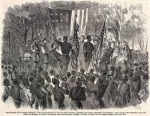
Voices From the Earth Chautauqua (VFTE Chautauqua) brings history and culture to life through creating humanities programs which invite lifelong learning, inquiry, and critical thinking. In this way we strengthen and preserve the best of our Appalachian and Affrilachian community.
VFTE emphasizes the diversity and history of American culture through storytelling and scholarly presentations. Scholars do extensive research of primary source documents, journals and diaries to reveal the wealth of our American history and bring that history to life in the form of first person narratives and historical portrayals, seminars, workshops and symposiums. VFTE pursues the opportunity for ongoing civil discourse about freedom, justice, and equality in America. Our current theme is the Journey of Freedom in America.
VFTE Chautauqua 2015
Life in Liberty Tour Following the Journey of Freedom in America
Rebuilding a Nation: Fulfilling the Promise of Freedom
VFTE Chautauqua commemorates the Journey of Freedom in America - Rebuilding a Nation: Fulfilling the Promise of Freedom is in memory of the historic Freedman’s community at Mitchelville, SC, the first self-governing Freedman’s Town in America. Beginning in November of 1862, before the Emancipation Proclamation went into effect, Mitchelville was built on the former Drayton Plantation on Hilton Head Island. It became known as “The Port Royal Experiment.” Union General Ormsby Mitchel proclaimed to the newly freed men and women, “You are in a position of responsibility. This experiment is to give you freedom, position, homes, your families, property, your own soil. It seems to me a better time is coming … a better day is dawning.”
Port Royal was a symbol of hope — a dream — for the creation of a society and nation based on genuine freedom where each and every soul truly was equal before God and man.
Port Royal, formerly the seat of the Southern Aristocracy, was home to the Port Royal Experiment, a radical rehearsal for the racial and economic reconstruction of the Deep South. Amid such wealth, fortune, and privilege, this community once sustained by slavery, became the battleground for the most radical of American ideals: freedom and equality.
The entire country scrutinized and assessed the “experiment.” Journalists embedded within the community and among the Black troops recorded the successes of those previously held in bondage in articles that altered both public opinion and political policy. The black community at Port Royal demonstrated its ability to learn, to organize, to work...to succeed; and America’s sable warriors proved their ability to fight. The men and women of Port Royal united in a common cause achieved great success.
Here are some reference materials:
The Port Royal Experiment Essay
The VFTE Chautauqua Companion Reader
Port Royal, SC Civil War Flash Cards
VFTE Chautauqua 2015 Event Flyer
TESTIMONIALS
The performance engaged the audience in the historical context of the times. Each character brought to life the qualities and challenges that marked the ongoing struggle for equality. I found the question/answer session after the performance to be just as interesting as the performance itself.
LeeAnn Brown
Director of Community Engagement
West Virginia Wesleyan College
I felt like I was talking to the actual people, not just an actor. I felt the spiritual connection the performers had made with the character they were portraying.
Cynthia Carr
Excellent scholarly work and well performed- thoroughly enjoyed the songs, too. I enjoy theater and am relearning history...Thank You!
Elizabeth Smith
This was a wonderful program! Our five-year-old kindergartners were on the front row and they were completely engaged during the entire presentation! Truly, an amazing way to experience history. Thank you VFTE!
Dr. Sara Stankus, Principal
Union Elementary School
2015 VFTE CHAUTAUQUA SCHOLARS
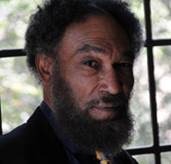 Charles Everett Pace Portraying Frederick Douglass
Charles Everett Pace Portraying Frederick Douglass
Charles Everett Pace has undergraduate and graduate degrees from The University of Texas at Austin (B.A., biology) and Purdue University in West Lafayette, Indiana (M.A., American studies: history and anthropology). As well as being a Program Advisor at the Texas Union, University of Texas at Austin, Charles has taught at The University of Nebraska-Lincoln, Purdue University, and most recently at Centre College in Kentucky. His research area is the anthropology of performance, experience and visual communications. He has performed and conducted workshops in hundreds of cities across the United States, as well as, in London, England. Pace has also conducted performance-based public diplomacy work for the United States Information Agency (USIA) in dozens of cities in nine countries across east, west and southern Africa.
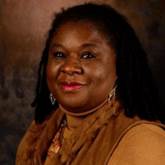 Arthuretta Martin Portraying Frances Harper
Arthuretta Martin Portraying Frances Harper
Ms. Martin holds a bachelor’s degree in public administration from James Madison University, a master’s degree in management from Florida Institute of Technology. She continued post graduate work in public policy and communication at George Mason University. She is a Certified Federal Contracts Manager through the National Contract Management Association, Distinguished Toastmaster through Toastmaster’s International and a member of the National Speaker’s Association. She is currently conducting research on the framers of civil rights era legislation. Ms. Martin is the Youth Leadership Coordinator for District 29, Toastmaster’s International.
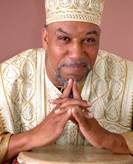 Jamal Koram Portraying Robert Smalls
Jamal Koram Portraying Robert Smalls
Jamal Koram, B.A., M.S., and Ed.S. is a veteran teacher, historian and scholar. He is the recipient of several storytelling and academic awards. Baba Jamal has received a Charles Stewart Mott Fellowship, The Zora Neal Hurston Award, and Phi Delta Kappa recognition. He has served as the president of the National Association of Black Storytellers for several different terms. Each spring, he leads a cultural workshop at Franklinton Center at Bricks for storytellers of African descent to continue timeless oral tradition and African American Heritage. Publications include an original version of Aesop’s Fables.
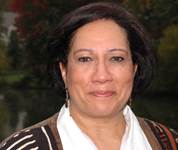 Ilene Evans Portraying Harriet Tubman
Ilene Evans Portraying Harriet Tubman
Ilene Evans has a B.A. from Trinity College in Deerfield, Illinois and a Master’s Degree from East Tennessee State University in the department of Education with an emphasis in Storytelling. She has spent the last 20 years as the artistic director of Voices From the Earth, an educational touring theatre company that uses storytelling and theatre to promote social justice. In 2009, Ilene was selected by the United States Embassy to tour Saudi Arabia, Kuwait, Bahrain and Columbia to share her work in the history and culture of African Americans through arts education, literature, and music.
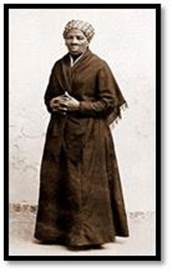 Harriet Tubman (1820-1913)
Harriet Tubman (1820-1913)
Harriet Tubman was part of the Anti-slavery resistance network was known as the Underground Railroad. Harriet Tubman was born into slavery in Maryland but escaped through the Underground Railroad to Pennsylvania in 1849. She then became the most famous leader of that network, aiding slaves in their escape to Free states and Canada. She was known as "Moses" to the hundreds of enslaved Africans and their descendants. Tubman helped to free hundreds of people held in bondage and inspired thousands of others. She was never caught and never lost anyone on the route to freedom. She served as a spy, nurse, scout, and guide for Union troops and was present at the ill-fated assault of Fort Wagner by the 54th Massachusetts in South Carolina.
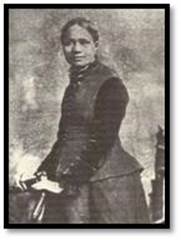 Frances Harper (1825-1911)
Frances Harper (1825-1911)
A poet and essayist, Frances Ellen Watkins was born in Baltimore in 1825. Orphaned at the age of three, Watkins went to live with her aunt and uncle, Harriet and William Watkins. She compiled her first collection of poems, Forest Leaves, in 1845. In 1860, Watkins married Fenton Harper and settled on a farm in Ohio. During her four-year marriage, she gave up lecturing in order to raise their daughter, Mary, and Fenton’s three children from an earlier marriage. She watched the progress of the Port Royal experiment from her home and wrote extensively. After her husband’s death saddled her with a large debt, Harper resumed lecturing for the antislavery cause, teaching, and writing poetry and novels in order to support herself and her family.
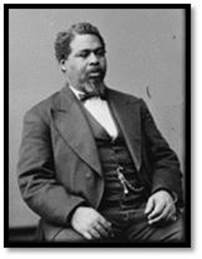 Robert Smalls (1839-1916)
Robert Smalls (1839-1916)
Robert Smalls was a self-liberated man who planned, and succeeded, in spiriting away his family on a Confederate Steam ship which was being operated as an armed transport and dispatch vessel. In April of 1862, he impersonated a captain and stole a Confederate ship, sent a rowboat to pick up waiting family members, sailed past five Confederate forts, and eventually turned the ship over to Union troops blockading the area. Smalls stood proudly at the Planter’s wheel. Only seven miles of water lay between the ship and the chance of freedom. With precision and amazing courage, he navigated past the Confederate forts in the harbor and steered the ship toward the safety of the Union fleet. Smalls continued to stay active in the U.S. Navy and later engaged in politics to protect the gains made by the war. He became the first African-American captain of a United States vessel and later served in both the South Carolina legislature and the United States Congress.
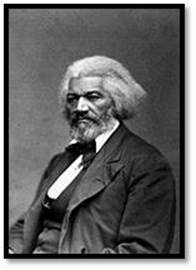 Frederick Douglass (1818- 1895)
Frederick Douglass (1818- 1895)
Fredrick Douglass was an American social reformer, orator, writer and statesman. After escaping from slavery, he became a leader of the abolitionist movement, gaining note for his dazzling oratory and incisive antislavery writing. Douglass wrote several autobiographies, eloquently describing his experiences in slavery in his 1845 autobiography, Narrative of the Life of Frederick Douglass, an American Slave, which became influential in its support for abolition. He wrote two more autobiographies, with his last, Life and Times of Frederick Douglass, published in 1881 and covering events through and after the Civil War. After the Civil War, Douglass remained active in the United States' struggle to reach its potential as a "land of the free". Douglass actively supported women's suffrage. Douglass was a firm believer in the equality of all people, whether black, female, Native American, or recent immigrant, famously quoted as saying, "I would unite with anybody to do right and with nobody to do wrong."
===============================================
VFTE Chautauqua 2014
Read a review from the Register-Herald
*SPECIAL PERFORMANCE*
Friday February 14, 2014 4:30-5:30pm - Ilene Evans as Bessie Coleman at the Clifton Center Cincinnati OH 45220 513 961-5681
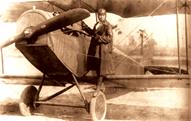 Bessie Coleman (1892-1926): AMERICAN AVIATOR
Bessie Coleman (1892-1926): AMERICAN AVIATOR
Brave Bronze Aviatrix of the Roaring Twenties
“You’ve never lived till you’ve flown! The air is the only place free of prejudices.” Bessie Coleman roared into the 1920’s in style, flying an aeroplane. She broke all the barriers that were placed before her: color, race, gender, poverty and a poor education. In 1921, Coleman earned her international pilot’s license from the Fédération Aéronautique Internationale, the first American, the first woman and the first person of color to do so. When aviation schools in the United States denied her entry, Coleman learned French and moved to France to earn her license from France's well-known Ecole d’Aviation des Frères Caudron. Coleman blazed a trail in the sky as the first Black Aviatrix, sometimes called Queen Bess, Brave Bess, and Daredevil of the Sky. “Because of Bessie Coleman,” wrote Lieutenant William J. Powell in Black Wings, “we have overcome that which was worse than racial barriers. We have overcome the barriers within ourselves and dared to dream.” In 1922, hers was the first public flight by an African-American woman in America.
CLICK HERE FOR THE SYMPOSIUM PROGRAM
CLICK HERE FOR THE SYMPOSIUM PRESS RELEASE
CLICK HERE FOR THE LEADING QUESTIONS DOCUMENT
CLICK HERE FOR THE ROLL CALL USTC PRESS RELEASE
VFTE CHAUTAUQUA
VFTE Chautauqua revives culture and community through humanities programs. VFTE Chautauqua’s mission: to educate, to enlighten and to empower through scholarly presentations, community conversations and cultural experiences.
The timing of the presentation is set to commemorate September 22, 1862, the date 151 years ago when President Abraham Lincoln signed the preliminary Emancipation Proclamation.
VFTE CHAUTAUQUA PROGRAMS DESCRIPTION
A scholar will portray a figure from the past telling their story in first person – stepping into the role of storyteller. Then they will then take time to answer questions of the audience as that character may have, using their knowledge of the person, their life and times as well as their circumstances. Then the scholar will step out of the role of the historical personage to answer questions that that person may not have been able to answer.
LEARNING OUTCOMES FOR VFTE CHAUTAUQUA PROGRAMS
- Introduce audience to race, class and gender diversity issues in Civil War Appalachia
- Introduce biographical story as a significant component of Affrilachian/Appalachian culture
- Demonstrate ways stigmatized individuals or groups address cultural bias, discrimination and stereotyping
- Provide opportunity to explore diversity and cultural differences through stories presented in first person narrative
- Introduce audience to impact of culture race, class and gender expectations and stereotypes
2014 VFTE CHAUTAUQUA SCHOLARS
 Captain Hari Jones USMC
Captain Hari Jones USMC
Hari Jones is the assistant director and curator of the Washington, D.C.-based African American Civil War Freedom Foundation and Museum. He is one of the foremost authorities on the role of African Americans in the Civil War. He served in the United States Marine Corps for over twenty years. He retired as a captain in 1997. Since then he has been conducting extensive research on African American military service throughout American history. Hari is convinced that one of the best ways to dispel the myths that marginalize the military contributions of African Americans is through museum exhibits. He was a content developer for the National Park Service (NPS) museum at the Tuskegee Airmen National Historic Site at Tuskegee, Alabama, a content adviser for the American Civil War Center exhibit ''Take Our Stand,'' and a content adviser for the National Archives and Records Administration (NARA) exhibit ''Discovering the Civil War.''
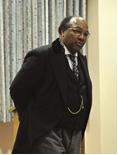 Dr. J. Holmes Armstead
Dr. J. Holmes Armstead
Dr. J. Holmes Armstead is a retired professor of Strategy and International law from the US Naval War College. He has taught international law, strategy and national security policy for nearly 40 years. Professor Armstead has served on faculties at Stanford University, Pepperdine University, the University of California, The University of Nevada, Southern University the US Naval Postgraduate School, Lewis University, the Virginia Military Institute and Washington and Lee University. He has also lectured at the British Joint Services Staff College and taught as a visiting professor at the Universite d'Pau in France and as an exchange professor at Richmond College in the University of London. He has lectured at senior staff colleges in Poland, Austria, Germany, Slovenia, and Malawi.as well as the US Army War College, at the United States Military Academy and the South African Military Academy Counsel to the American bar Association Office of Human Rights, Dr. Armstead lectures on International law at the Austrian Academy of Higher Military Studies in Vienna.
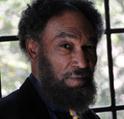 Professor Charles Everett Pace
Professor Charles Everett Pace
Charles Everett Pace has undergraduate and graduate degrees from The University of Texas at Austin (B.A., biology) and Purdue University in West Lafayette, Indiana (M.A., American studies: history and anthropology). As well as being a Program Advisor at the Texas Union, University of Texas at Austin, Charles has taught at The University of Nebraska-Lincoln, Purdue University, and most recently at Centre College in Kentucky. His research area is the anthropology of performance, experience and visual communications. He has performed and conducted workshops in hundreds of cities across the United States, as well as, in London, England. Pace has also  conducted performance-based public diplomacy work for the United States Information Agency (USIA) in dozens of cities in nine countries across east, west and southern Africa.
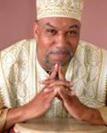 Baba Jamal Koram, B.A., M.S., and Ed.S.
Baba Jamal Koram, B.A., M.S., and Ed.S.
Baba Jamal Koram is the recipient of several storytelling and academic awards. Baba Jamal has received a Charles Stewart Mott Fellowship, The Zora Neal Hurston Award, and Phi Delta Kappa recognition. He has served as the president of the National Association of Black Storytellers for several different terms. Each spring, he leads a cultural workshop at Franklinton Center at Bricks for storytellers of African descent to continue timeless oral tradition and African American Heritage. Recent publications include an original version of Aesop’s Fables.
 Joey Madia, author, director and actor
Joey Madia, author, director and actor
Joey Madia is a playwright, teaching artist, director, and actor. He is the Artistic Director/Resident Playwright of Seven Stories Theatre Company, Inc. and Resident Playwright at Youth Stages, LLC. He has appeared in or directed over 80 plays. He specializes in social justice theatre and participatory plays for youth with17 original plays for young audiences. He has written and performed pieces about Civil War captains Louis Emilio and Thomas Maulsby. He has worked with organizations including The Epilepsy Foundation of NJ and Camp NOVA to bring theatre to students with disabilities and has won three writing awards from VSA of NJ. His poetry, essays, and short stories have been widely published and have earned him several awards. His first novel, Jester-Knight, was published in 2009. His second novel, Minor Confessions of an Angel Falling Upward was published in 2012 (Burning Bulb Publishing). He is a book and music reviewer and the founding editor of NewMystics.com, an art and literary site.
 Dr. Connie Park Rice, Ph.D. in History WVU - Moderator
Dr. Connie Park Rice, Ph.D. in History WVU - Moderator
Dr. Rice will act as the lead scholar and moderator for the symposium events and participate provide her expertise on West Virginia Black history and the role of Black West Virginian in the Civil War for the companion materials. Dr. Rice, is a Lecturer in the History Department at West Virginia University and Assistant Editor of West Virginia History: A Journal of Regional Studies. B.A. in history, an M.A. in Public History and a Ph.D. in American History from West Virginia University. Dr. Rice has been a member of the Governor’s West Virginia Sesquicentennial of the American Civil War Commission. She is the author of numerous articles and book chapters and recently completed work on two manuscripts, Don’t Flinch an Inch: The Life and Legacy of West Virginia Civil Rights Pioneer J.R. Clifford and Women of the Mountain South: Identity, Work, and Activism, an edited collection of essays.
 Ilene Evans, M.A. in Education specialty in storytelling
Ilene Evans, M.A. in Education specialty in storytelling
After receiving her B.A. from Trinity College in Deerfield, Illinois, Ms. Evans completed her Master’s Degree at East Tennessee State University in the department of Education with an emphasis in Storytelling. She has spent the last 20 years as the artistic director of Voices From the Earth, an educational touring theatre company that uses storytelling and theatre to promote social justice. In 2009, Ilene was selected by the United States Embassy to tour Saudi Arabia, Kuwait, Bahrain and Columbia to share her work in the history and culture of African Americans through arts education, literature, and music.
